Walk-in Refrigerator Market Size,Share 2032
The global walk-in refrigerator market size was valued at $11.2 billion in 2022 and is projected to reach $20.2 billion by 2032, growing at a CAGR of 6.1% from 2023 to 2032.The increase in industrial need for cold storage areas for food storage, food transit, and pharmacies acts as a key driver of the global walk-in refrigerator market. This is attributed to the fact that walk-in freezers are utilized to keep a huge capacity of items all year while still focusing on stock rotation.
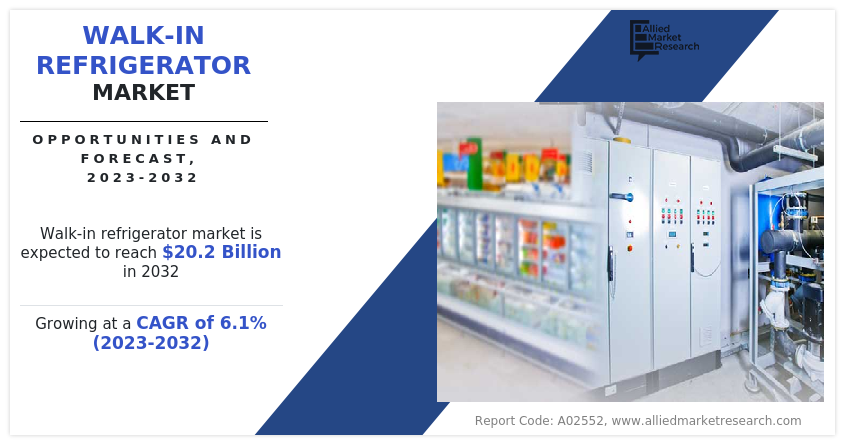
The walk-in refrigerator market is segmented into Type, Door Type and End Use.
MARKET DYNAMICS
A walk-in refrigerator, commonly used in commercial settings such as restaurants and supermarkets, is a large, insulated storage space designed to maintain low temperatures for preserving perishable items. These refrigerators feature durable construction with thick insulated walls and airtight doors to ensure efficient temperature control and energy conservation. They are available in various sizes to accommodate different storage needs, from small-scale units for restaurants to expansive ones for industrial warehouses.
Walk-in freezers offer easy access and plenty of storage capacity; hence, they are suitable for high-volume organizations that prioritize stock rotation and product purity. These freezers are specially designed to increase stock life by maintaining stock at a uniform temperature. The goal is to resist temperature fluctuations as low as possible in other stores; even little changes might harm or render products unsuitable.
Furthermore, technological advancements such as auto temperature control and unlocking mechanisms and Bluetooth connectivity in walk-in refrigerators significantly contribute toward the growth of the market. Consistent temperature regulation keeps cold air from escaping from the storage. In addition, if the temperature rises to a level that is unsafe, operators get notified. The temperature range of walk-in freezers further minimizes freezer burn and reduces product degradation. As a result, businesses may preserve products for extended periods of time while reducing waste.
The use of Bluetooth warns operators when acceptable temperatures are not being maintained. Alarm systems can be used to alert when walk-in doors are left open. In addition, motion detector lighting guarantees that lights are not left on needlessly. Furthermore, temperature monitoring and recording systems can aid operators in adhering to Hazard Analysis Critical Control Point (HACCP) rules.
Furthermore, walk-in refrigeration systems are often designed to endure severe use. They are composed of long-lasting materials such as stainless steel and reinforced insulation that can withstand the wear and tear of a business setting, thereby making them ideal for use in cafés, restaurants, and commercial kitchens. It can readily store important and expensive commodities, including drinks while keeping them fresh which is expected to propel walk-in refrigerator market demand during the forecast period.
SEGMENTAL OVERVIEW
The global walk-in refrigerator market is segmented into type, door type, end user, and region. By type, the market is divided into indoor and outdoor. On the basis of door type, it is categorized into insulated flush door and slide door. Depending on end user, it is classified into retail food service, full-service restaurant & hotel, healthcare facilities, full-service restaurant & hotels, and others. Region wise, it is analyzed across North America (the U.S., Canada, and Mexico), Europe (France, Germany, Italy, Spain, UK, Russia, and rest of Europe), Asia-Pacific (China, Japan, India, Australia, South Korea, Malaysia, Indonesia, Thailand, and rest of Asia-Pacific), and LAMEA (Brazil, South Africa, South Arabia, UAE, Argentina, and rest of LAMEA).
By Type
By type, the indoor segment dominated the market in 2022 and is anticipated to continue this trend during the forecast period. This is majorly attributed to the fact that indoor walk-in refrigerators are frequently less expensive to acquire than outdoor ones, and they cost less to operate on average. Moreover, their versatility and scalability help organizations develop by providing effective and flexible storage solutions that fit with their increasing inventories. Furthermore, technical breakthroughs promoting energy efficiency have accelerated their adoption and reduced concerns about environmental effects and running expenses. This increase in demand for dependable, efficient, and flexible indoor walk-in refrigeration systems is notably contributing to the growth of the market.
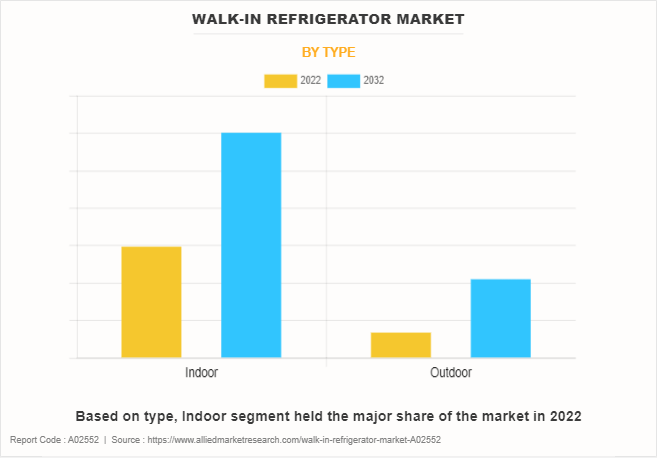
By Door type
By door type, the insulated flush door segment held the major walk-in refrigerator market share in 2022. These refrigerators feature tightly sealed doors that prevent cold air from escaping and warm air from entering, minimizing energy consumption and reducing operating costs for businesses. Additionally, their efficient insulation helps maintain precise temperature control, ensuring optimal storage conditions for perishable goods, which is crucial for industries like food retail, pharmaceuticals, and hospitality, thereby driving the demand for Insulated Flush Door walk-in refrigerators.
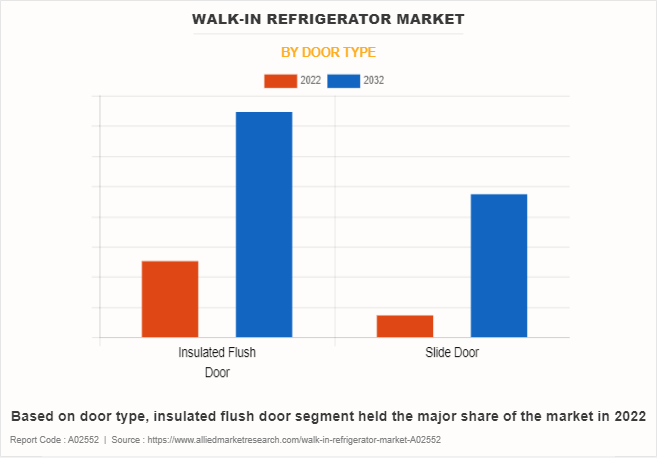
By End use
By end use, the food processing industry segment is predicted to exhibit high growth potential during the forecast period, owing to Walk-in refrigerators providing ample space for storing large quantities of perishable ingredients and finished products at precise temperatures, helping food processing facilities meet stringent safety standards and regulations. Additionally, the trend toward globalization of food supply chains and the rising demand for processed and packaged foods further drive the need for efficient and hygienic refrigeration solutions, thereby fueling the demand for walk-in refrigerators in the food processing industry.
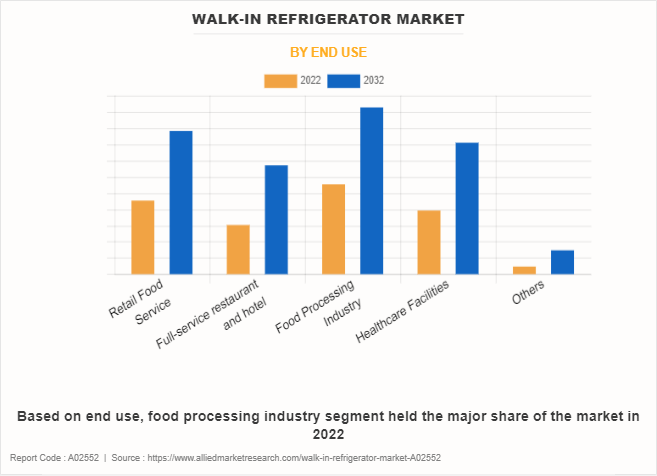
By Region
Region-wise, North America held the major share of the market due to the fact that the region is witnessing a surge in demand for innovative and sustainable walk-in refrigerators. Furthermore, compared to other nations, the habit of bulk purchasing and keeping huge quantities of food in stock or inventory is more widespread in the U.S. This increases demand for bigger refrigerators with more storage space propels the market growth. The size of refrigerators is also affected by cultural and lifestyle differences since food consumption and cooking techniques vary between regions and nations. The increase in demand for frozen and preserved foods in the North America region is expected to propel growth during the walk-in refrigerator market forecast.
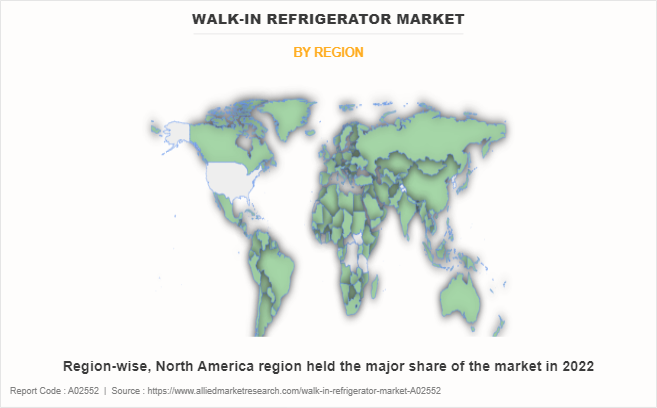
COMPETITION ANALYSIS
The players in the walk-in refrigerator market have adopted acquisition, business expansion, partnership, collaboration, and product launch as their key development strategies to increase profitability and improve their position in the market.
The key players operating in the global walk-in refrigerator market include Industrial Refrigeration Pvt. Ltd., AB Electrolux, Panasonic Corporation, Dover Corporation, Haier Biomedical, Norlake, Inc., Thermo-Kool, Bally Refrigerated Boxes, Inc., KPS Global LLC, and Everidge, Inc. Several well-known and upcoming brands are competing for market dominance in the fiercely competitive walk-in refrigerator industry. Smaller, niche companies have become well-known for catering to consumer demands and preferences. However, still control the majority of the market and frequently introduce new innovative and lucrative walk-in refrigerators.
Key Benefits For Stakeholders
- This report provides a quantitative analysis of the market segments, current trends, estimations, and dynamics of the walk-in refrigerator market analysis from 2022 to 2032 to identify the prevailing walk-in refrigerator market opportunities.
- The market research is offered along with information related to key drivers, restraints, and opportunities.
- Porter's five forces analysis highlights the potency of buyers and suppliers to enable stakeholders make profit-oriented business decisions and strengthen their supplier-buyer network.
- In-depth analysis of the walk-in refrigerator market segmentation assists to determine the prevailing market opportunities.
- Major countries in each region are mapped according to their revenue contribution to the global market.
- Market player positioning facilitates benchmarking and provides a clear understanding of the present position of the market players.
- The report includes an analysis of the regional as well as global walk-in refrigerator market statistics, trends, key players, market segments, application areas, and market growth strategies.
Walk-in Refrigerator Market Report Highlights
| Aspects | Details |
| Forecast period | 2022 - 2032 |
| Report Pages | 301 |
| By End Use |
|
| By Type |
|
| By Door Type |
|
| By Region |
|
| Key Market Players | Industrial Refrigeration Pvt. Ltd., Norlake, Panasonic Corporation, AB Electrolux, kps global llc, Dover Corporation, Bally Refrigerated Boxes, Inc., Everidge, Inc, Haier Biomedical, Thermo-Kool |
Analyst Review
According to the insights of CXOs of leading companies, the walk-in refrigerator market represents a crucial investment opportunity driven by several factors. Ensuring food safety and quality is paramount for businesses across various industries, including food retail, hospitality, and pharmaceuticals. Walk-in refrigerators provide reliable cold storage solutions that are essential for preserving perishable goods and complying with stringent regulatory requirements. As such, executives recognize the importance of investing in state-of-the-art refrigeration systems to uphold brand reputation, mitigate risks associated with spoilage, and maintain customer satisfaction.
In addition, the evolving landscape of the food industry, rising online food delivery services, and growing demand for fresh produce present new opportunities. CXOs understand the need to adapt to changing consumer preferences and market dynamics by investing in innovative walk-in refrigeration technologies that enhance efficiency, sustainability, and operational flexibility. By strategically leveraging these solutions, companies can gain a competitive edge, drive growth, and capitalize on emerging opportunities within the walk-in refrigerator market.
The global walk-in refrigerator market size was valued at $11,234.4 million in 2022 and is projected to reach $20,204.6 million by 2032, registering a CAGR of 6.1% from 2023 to 2032.
The global walk-in refrigerator market is segmented into type, door type, end user, and region. By type, the market is divided into indoor and outdoor. On the basis of door type, it is categorized into insulated flush door and slide door. Depending on end user, it is classified into retail food service, full-service restaurant & hotel, healthcare facilities, full-service restaurant & hotels, and others. Region wise, it is analyzed across North America (the U.S., Canada, and Mexico), Europe (France, Germany, Italy, Spain, UK, Russia, and rest of Europe), Asia-Pacific (China, Japan, India, Australia, South Korea, Malaysia, Indonesia, Thailand, and rest of Asia-Pacific), and LAMEA (Brazil, South Africa, South Arabia, UAE, Argentina, and rest of LAMEA)
Asia-Pacific is the largest regional market for walk-in refrigerator
The key players operating in the global walk-in refrigerator market include Industrial Refrigeration Pvt. Ltd., AB Electrolux, Panasonic Corporation, Dover Corporation, Haier Biomedical, Norlake, Inc., Thermo-Kool, Bally Refrigerated Boxes, Inc., KPS Global LLC, and Everidge, Inc.
The global walk-in refrigerator market report is available on request on the website of Allied Market Research.
Loading Table Of Content...
Loading Research Methodology...



